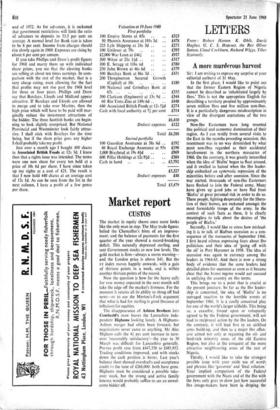A more murderous harvest
LETTERS
From : Robert Horton. K. 0 bih, David Hughes, G. C. S. Hopcutt, the Rev Oliver Sutton, Claud Cockburn, Richard Wiggs, Tibor Szamuely.
Sir: I am writing to express my surprise at your editorial outburst of 31 May..
In the first place, I would like to point out that the former Eastern Region of Nigeria cannot be described as inhabitated largely by Ibos.' This is not the appropriate English for describing a territory peopled by approximately seven million Ibos and five million non-lbos. It is a particularly dangerous misdescription in view of the divergent aspirations of the two groups.
Non-Ibo Easterners have long resented Ibo political and economic domination of their region. As I can testify from several visits to the East in the months preceding secession, this resentment was in no way diminished by what most non-Ibos regarded as their accidental involvement in the northern massacres of 1966. On the contrary, it was greatly intensified when the idea of 'Biafra' began to float around, and it swelled to hatred when the Ibo leader- ship embarked on systematic repression of the minorities before and after secession. Since the war started, thousands of non-Ibo Easterners have flocked to join the Federal army. Many have given up good jobs or have fled from `Biafra' at great personal risk in order to do so. These people, fighting desperately for the libera- tion of their homes, are reckoned amongst the most formidable troops of the army. In the context of such facts as these, it is clearly meaningless to talk about the desires of 'the people of Biafra.'
Secondly, I would like to stress how mislead- ing it is to talk of Biafran secession as a con- sequence of the massacres of September 1966. I first heard oilmen expressing fears about Ibo politicians and their idea of 'going off with the oil' in Port Harcourt in 1958. The idea of secession was again in currency among Ibo leaders in 1964-65. And there is now a strong body of evidence that the same leaders laid detailed plans for secession as soon as it became clear that the Ironsi regime would not succeed in unifying the country on Ibo terms.
This brings me to a point that is crucial at the present juncture. So far as the Ibo leader- ship is concerned, the idea of 'Biafra' is -no outraged reaction to the horrible events of September 1966. It is a coolly conceived play for one of the world's larger oilfields. This being so, a ceasefire, forced upon or voluntarily agreed to by the Federal government, will not lead to reciprocal action by the Ibo leaders. On the contrary, it will lead first to an airlifted arms build-up, and then to a major Ibo offen- sive aimed not only at regaining the oil- and land-rich minority areas of the old Eastern Region, but also at the conquest of the more attractive neighbouring areas of the rest of Nigeria.
Thirdly, I would like to take the strongest possible issue with your snide use of words and phrases like `gas-oven' and !final solution.' Your implied comparison of the Federal government with the Nazis and of the Ibo with the Jews only goes to show just how successful Ibo image-makers have been in draping the
wolf in their back garden with sheep's clothing. In fact, the Nazi style of the present Ibo leader- ship has impressed itself on many reflective European observers here—not least on those of my German acquaintances who served with uneasy consciences in the Second World War. The noxious myth of the Ibo Ubermensch is per- haps the most striking manifestation of the style. This myth, flaunted by Ibos before the peoples of the north, was one of the factors contributing to the 1966 massacres. It was the basis of the military miscalculation which brought Ibo leaders to their disastrous decision to secede. Every day, spewed forth obscenely in the broad- casts of Radio Biafra, it sends a few hundred more innocent men to unnecessary deaths at the front.
In conclusion, I hope the British government will ignore the broth of confused emotions and shady financial interests that slops about in the pot labelled 'Liberalism.' I hope Mr Wilson will trust the Federal government to conclude this unpleasant business in a humane way, and will supply it with any arms still required for the purpose. If he capitulates to the forces now engaged in pressuring him, and thus aids and abets an Ibo military reoccupation of the whole of the old Eastern Region, be may well find himself responsible for an obliteration of human life which dwarfs any of the atrocities that have occurred so far.
Robert Horton Senior Research Fellow (Niger Delta Studies). Institute of African Studies, Ibadan University







































 Previous page
Previous page